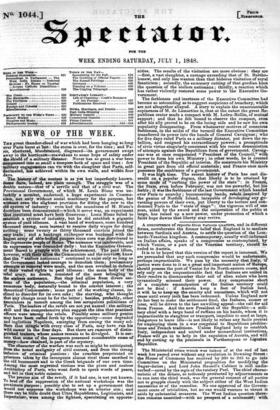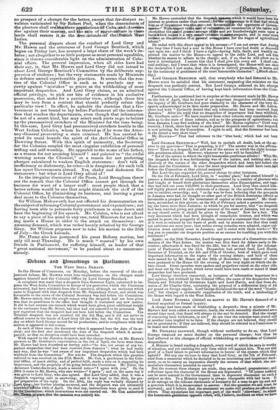The Ministerial crisis winch was taikeu of at the end
of last week has passed over without any revolution in Downing Street : the House of Commons has resolved by 260 to 245 to go into Committee on the Ministerial proposition for modifying the Sugar-duties ; and Lord John Russell's Cabinet is still undis- turbed—saved by the tegis of the tutelary Peel. The chief charac- teristic of the debate, so tediously protracted by adjournments as to run into the third week, was the general consent of all parties not to grapple closely with the subject either of the West Indian necessities or of the remedies. No one approved of the Govern- ment cento of trivialities, but no one would venture to thrust it aside by substantial measures. The West Indian question there- fore remains unsettled—with no prospect of a settlement; with
no prospect of a change for the better, except that far-distant re- vulsion vaticinated by Sir Robert Peel, when the descendants of the planters shall seettlae.altive populationsOCubaaandiAmeitlea rise against their masters, and the ruin of eggar-ntdtare in these lands shall restore AA° the icee thensitish West Indies.
The personal dispute about the conduct of Lord Grey and Mr. Hawes and the strictures of Lord George Bentinck, which began on Friday last, has usurped a large share of the week's de- bates ; not altogether to so little purpose as most personal squabbles, iince it throws considerable light on the administration Of Colo- nial affairs. The general impression, when all aides have had their say, is, that Mr. Hawes and Lord' Greydid not intend to cheat Lord George Bentinck's Committee by the deliberate sup- pression of evidence ; but the very statements made by Ministers in defence unveil reprehensible practices. It seems that the rou- tine of- the Colonial Office is such as to preclude any se- curity against "mistakes" so grave as the withholding of most important despatches. And Lord Grey claims, as an admitted official privilege, to pick out bits of evidence in his exclusive possession, that make for a particular view, although those bits -may be torn from a context that should perfectly refute that 'particular view 1 In effect, he upholds the doctrine that a Go- vernment is not bound to lay before Parliament all the informa- tion that reaches the departments, even though that information '-be not of a secret kind, but may select such parts as go to bolster • vp the preconceived crotchets of the Minister for the time being. In this case, Lord Grey had preconceived crotchets hostile to the West Indian Colonies, whom he treated as if he were the Attor- ney -General prosecuting a state criminal. He has carried be- yond its usual bounds the spirit of the Anti-Colonial Office in 'Downing Street. With this spirit of animosity, the Secretary for the Colonies coupled the most bingular exhibition of personal
• trifling and self-worship. He appealed to the name of his father, as a reason for not accusinghimself! and pointed to "the awful warning across the Channel," as a reason for not preferring charges calculated to weaken English statesmen : don't talk of inefficiency or dishonesty, he cries—it is dangerous ; for such talk has upset Governments abroad. Yes, shaky and dishonest Go- vernments: but what is Lord Grey afraid of ? In the irregular discussion of the Peers, Lord Brougham threw out the remark that the Colonial Office cannot get through its business for want of a larger staff: most people think that a better reform would be one that might diminish the staff of the Colonial Office, by diminishing its business, and leaving a great deal more to the Colonies themselves.
Sir William Molesworth has not effected his demonstration on the subject of reforming Colonial government and expenditure ; not having been able to persuade forty gentlemen to come down and bear the beginning of his speech. Mr. Cobden, who is not afraid to say a piece of his mind to any one, rated Ministers for not hav- ing made a Houser in older to the, attack on themselves : an amusing- demand, which was rather keenly rebuked by Sir George Grey. Sir William proposes now to take his motion to the 2-.5th Of July—the Greek kalends.
"Mr. Hume also has postponed his great Reform motion, but only till next Thursday. He is much " roasted" by his own friends in Parliament, for suffering himself, as leader of that "great national movement," to be pushed about so unceremo- niously.



























